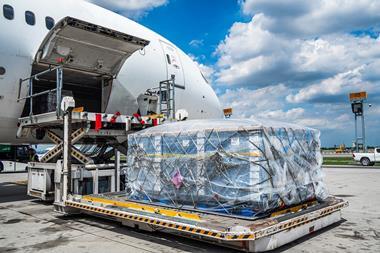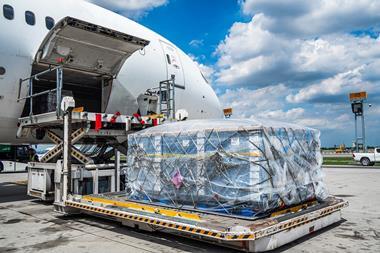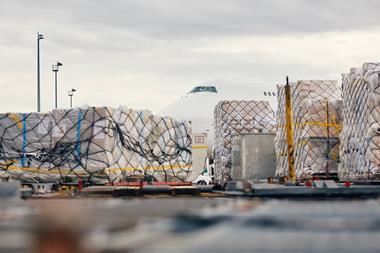
Photo: William Potter/ Shutterstock
When the White House announced China would no longer be able to benefit from the de minimis exemption that allowed packages valued under $800 to be imported duty free, the air cargo industry was left pondering what this meant for its future given the amount of e-commerce it handles.
The US quickly reinstated the exemption – temporarily at least – when it became clear US Customs and Border Protection did not have the systems in place to process data and duty on an estimated 4m packages per day.
However, the move served as a wake-up call for the e-commerce, express and air cargo industries with the White House stating that the de minimis ban would be brought back as soon as adequate systems are in place to “fully and expediently process and collect tariff revenue”.
When the exemption does eventually come to an end, two companies that will be heavily affected are China-based e-commerce platforms Temu and Shein.
John Lash, group vice president of product strategy at supply chain platform e2open, said the move would “reshape international B2C e-commerce”.
“Shein, Temu and similar companies thrived by shipping individual parcels under de minimis, avoiding duties,” he said.
“Now, they may have to shift their business models, likely by consolidating shipments into bulk imports and setting up US-based distribution centres to store goods and handle local deliveries.
“Also, transitioning from individual e-commerce parcel shipments to a more traditional retail import model.
“Previously, these companies benefited from a ‘double win’: no duties and streamlined shipping. With 35% tariffs and complex filings, their profitability will take a hit, forcing them to rethink their logistics strategies.”
He added that another group that will take a hit from the potential future change is consumers as the goods they order online from China will face tariffs of up to 35% and additional filing fees, which can drive up prices by 20-50%.
“Additionally, once these rules take effect, shipments will require more complex processing, potentially delaying deliveries and increasing costs across the board,” he said.
Lash said that the de minimis exemption – introduced in 1938 when it was set at $5 – was originally created to help small businesses but had been exploited by global e-commerce companies.
Ram Ben Tzion, chief executive and co-founder of digital vetting platform, Publican, agreed that consumers faced paying more and waiting longer for items to be delivered.
However, he added that consumption habits can evolve, and the move would result in suppliers becoming more reliable, safer and more ethical.

Source: Gorodenkoff/shutterstock.com
Tzion reckoned a flat fee could be introduced to simplify duty collection. He also said that the de minimis threshold may not go completely once the dust has settled, instead reducing it to $200.
“Such measures will hurt Temu’s price-sensitive value proposition and Shein’s time-sensitive value proposition,” he said.
“The suspension of the executive order caused disruptions in the supply chain,” he added. “The 48-hour notice served as a wake-up call, signalling to the industry that things were going to change quickly.
“Marketplaces, logistics operators and customs brokers need to adjust quickly to the new rules set in place by the Trump administration.”
Business model changes
Tzion said that Temu, which focuses on lower-cost items and offers free shipping and returns, will face the most significant challenges to its business model without the de minimis loophole.
“For Temu to remain viable in the US market, it will need to consider shifting some manufacturing to the US or alternative countries and make their operations more transparent,” he said.
“It’ll also need to comply with national security and safety standards. The identification of sellers may also need to become more transparent.”
He added: “The broader e-commerce ecosystem will undergo dramatic shifts. This will require companies to rethink their business strategies and invest in new systems to comply with regulatory changes.”
He added that the application of new de minimis regulation and duties to Chinese products is an obvious first step and the expansion of new policies to additional countries of origin is a very probable scenario.
Freight forwarders, logistics operators and carriers will need to shift their priorities and attention to compliance, Tzion added.
“Everyone will need to scale up their customs brokerage game,” he said.
For airlines, air cargo capacity might become redundant due to its cost and the e-commerce platforms may shift more volume to ocean, enabled by the need to have warehouses in the US.
Indeed, figures from data provider Rotate show that two weeks after the end of the Chinese New Year, when capacity out of China is reduced as factories close, freighter flights between Asia and the US were “still down” by 13%, or 12 daily flights.
The analyst and consultant said this is the equivalent of 24 freighters now being made available for other markets.
This potentially reflects the introduction of US tariffs on China and the impact of the short-lived removal of the de minimis exemption, although it is hard to disentangle how much of this decline was caused by the Lunar/Chinese New Year holiday and how much is down to the short-lived de minimis ban.
One company that is expecting the “looming cancellation” of de minimis eligibility for Chinese imports to “significantly reduce the surge of e-commerce goods arriving in the US by air” is rate portal Freightos.
The company’s head of research Judah Levine said that e-commerce volumes had kept planes full and air cargo rates highly elevated since late 2023
The de minimis cancellation would increase delivery times and push price tags up by as much as 50% for items that continue to ship by air, he reckoned.
“Temu and Shein had already begun preparations for a shift away from reliance on de minimis and air cargo, with more than a third of Temu’s US orders reportedly already fulfilled from sellers with US-based inventory,” said Levine.
“Nonetheless, these platforms are scrambling to adjust to the coming policy change by raising prices, pushing sellers to build up US inventories and incentivising manufacturing shifts to Vietnam and other China alternatives.”
Freightos data show that airfreight rates had slightly decreased in recent weeks, suggesting that air rates could decline gradually up until de minimis is cancelled and then more sharply once the change goes into effect.
For the express operators, such as UPS, FedEx and DHL, the impact will be “dramatic” but will also create opportunities.
“It will increase in workload and complexity in the customs clearance and processing departments, drive costs, and may cause delays,” Tzion said.
“It is not necessarily bad news for the service providers, as they will become even more essential to e-commerce operations.
“Logistic operators who will be agile and innovative enough can create competitive advantage through digital services, thus unlocking new revenue streams and tremendous value.”
Lash agreed that forwarders, as well as CBP, would face the burden of managing and processing standard import filings for all of the packages.
“In the near term, this will create a big hit on efficiency and productivity, adding costs each step of the way. In the long term, exporters are likely to shift from individual international B2C parcel shipments to more efficient modes of bulk transportation into the US.”


















